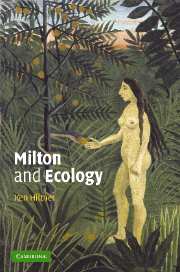Book contents
- Frontmatter
- Contents
- Acknowledgments
- Preface
- Introduction
- PART I HAVING PLACE
- PART II THE UNDERLYING IMPORTANCE OF PLACE
- 5 The New Testament's call to place: Paul's and Luther's deconstructions
- 6 Rejecting the placeless ancient doctrines: confusing Paradise Regained
- 7 The Old Testament's call to place: Job's wisdom in Milton's poetry
- 8 The influence of time on place: forbidding unripe fruit
- 9 Place, body, and spirit joined: the Earth–Human wound in Paradise Lost
- Notes
- Select bibliography
- Index
6 - Rejecting the placeless ancient doctrines: confusing Paradise Regained
Published online by Cambridge University Press: 15 December 2009
- Frontmatter
- Contents
- Acknowledgments
- Preface
- Introduction
- PART I HAVING PLACE
- PART II THE UNDERLYING IMPORTANCE OF PLACE
- 5 The New Testament's call to place: Paul's and Luther's deconstructions
- 6 Rejecting the placeless ancient doctrines: confusing Paradise Regained
- 7 The Old Testament's call to place: Job's wisdom in Milton's poetry
- 8 The influence of time on place: forbidding unripe fruit
- 9 Place, body, and spirit joined: the Earth–Human wound in Paradise Lost
- Notes
- Select bibliography
- Index
Summary
Hast thou not right to all Created things?
Milton's SatanParadise Regained is a confusing text. In noting this I certainly mean to draw attention, as Barbara Lewalski did some thirty years ago, to the way readers have thought of the epic for more than three centuries, that the brief epic is “Milton's most perplexing” major poem. But more than just perplexing, Paradise Regained brings the necessary con-fusion to take apart what hundreds of years of Western thinking have “fused” together; namely the Christian, Greek, Roman, and the Judaic traditions. In this sense of “con-fusing” I do mean “de-constructing,” though this sort of deconstructing does not so much de-construct a text as it con-fuses readers, in so far as it takes apart something of us as we are born into a fusion of these ancient traditions. Which raises the question, why should Milton, classicist non pareil, officiate over the divorce of what for a lifetime he had wed? Is it that Milton himself was simply confused? In this present section I intend to suggest just that: that Milton, and the Christianity he cherished throughout his life, is thoroughly “confused” in Paradise Regained, which gave the poet an astonishingly clear understanding of himself and his faith through this radical deconstruction.
To recap quickly my last section: in Luther's reading of 1 Corinthians, Paul was attempting to stand in direct opposition to the prevailing Greek thought of the time: because “the Greeks seek after wisdom,” Christians should “preach Christ crucified … unto the Greeks foolishness”; nonetheless, “the foolishness of God is wiser than men” (1 Corinthians 1:22–25).
- Type
- Chapter
- Information
- Milton and Ecology , pp. 86 - 101Publisher: Cambridge University PressPrint publication year: 2003

